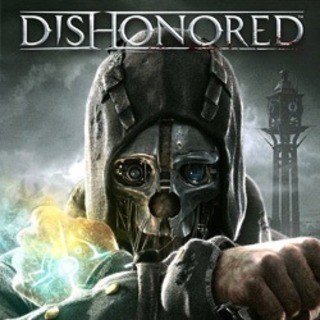Many modern games offer a certain amount of player choice-multiple ways to complete tasks or progress the story-but few manage to achieve the satisfying consistency of Dishonored. Some games often only have one or two worthwhile options in gameplay situations, whereas every different approach to combat or traversal is engaging in Dishonored. Whether you want to be a silent assassin, a sneaky pacifist, or an overt murderer, you'll have a fantastic time. And you can incorporate different tactics at any time, so you're not pigeon-holed in one style of play throughout the game. It's just a shame its story doesn't have as much of a lasting impression.
You play as Corvo Attano, former head bodyguard to the Empress now turned assassin. After being framed for the Empress's murder and escaping prison, Corvo joins a rebel group and is assigned to take out important targets of the new tyrannical regime. The prologue sets up an interesting revenge tale set in a rich steampunk world, but only the latter is offered. The story is a predictable one, featuring a cast of mostly dull and forgettable characters, a plot that wraps up too quickly, and a poor, anticlimactic ending. It serves its purpose of transitioning you to new levels, but it's entirely a missed opportunity. The city of Dunwall in which the story is set, however, has a rich and interesting history founded on whale oil that is fleshed out in books around its dreary, atmospheric environments. Personal journal entries and audiographs also found in the game's levels reveal the city's current troubled times dealing with a widespread rat plague, an oppressive government, and religious conflict.
The religious conflict involves an established order opposing the heretical worship of The Outsider, a mysterious supernatural being who grants Corvo magical abilities early on in the game. The first of these is Blink, the power to teleport silently across a set distance in any direction. The skill is key in getting around the large levels quickly without being noticed, and it's exhilarating to blink behind an enemy, take him out, and blink to the top of a lamppost just before another enemy spots you. The levels in Dishonored are designed for frequent use of Blink, with plenty of rooftops, ledges, and catwalks to take advantage of, so you're not required to sneak or fight your way through the alleys and hallways of Dunwall. Although Blink is generally a fun and effective skill, some areas within reach are inaccessible, which can be devastating in moments of escape, and it's sometimes difficult to tell at a distance whether you'll vault onto a ledge or miss and plummet to the ground.
The rest of the supernatural powers must be unlocked and upgraded by collecting runes around the environments, a task much easier with the help of a creepy talking mechanical heart which locates hidden objects as well as reveals characters' secrets. The problem with this method is that you won't unlock certain abilities until very late in the game when there's not much time to experiment with them, or at all depending on how you spend your runes. The only way to acquire unearned powers is to start a new game, relinquishing your current powers, so you can collect runes again and spend them differently. With so many ways to play, Dishonored is a game you'll want to revisit, but having to start from scratch diminishes its replay value.
Though the list of magical abilities is short, their applications are numerous and creative. For instance, you can possess a guard, walk him into a closet, and knock him out, or, you can walk him to a balcony and use another power, a forceful blast of wind, to throw him off. These powers combined with your arsenal offer a staggering number of ways to deal with an area of enemies. To avoid killing anyone, you can freeze time and run past guards unnoticed or knock out enemies one-by-one with sleep darts and hide their bodies in a nearby dumpster. Deadlier strategies might involve calling forth a feral swarm of plague rats to overwhelm and devour guards or rewiring security systems to vaporize nearby enemies instead of you. The standard approaches of stabbing clueless guards in the back and rushing into the open with a shotgun pistol in one hand and sword in the other are viable options as well and preserve your mana and ammunition. All of these tactics are satisfying, but Dishonored is most rewarding when you combine uses of weapons or magic for brutal attacks or clever escapes.
Most of the levels in Dishonored involve infiltrating a building and taking out a key target and both offer freedom of choice just like the combat. There are always rooftop entrances, secret side doors, and underground passageways to get to a target's location, and there are even some opportunities to possess a rat and travel through vents. Set situational options are offered in getting rid of your targets, both lethally and non-lethally. For example, in one level you can poison your prey's drink or find a way to excommunicate him from his religion, thus dismissing him from power. You can also choose to kill your target like you would any other enemy, and the many creative ways which you can do so offsets forsaking the unique options laid out for you.
With so many ways to go through levels to oust the illegitimate authorities, Dishonored fully embraces the philosophy of player choice and pulls it off remarkably well. Both the stealth and the action are rewarding and enjoyable, and the ability to improvise using an array of powers and weapons makes Dishonored an accessible yet deep gameplay experience throughout. Its intriguing dystopian world may not have been put to the best use with such a weak story, but this and its other minor flaws can easily be overlooked, because its excellent gameplay alone lets Dishonored stand as one of the best games of 2012.

